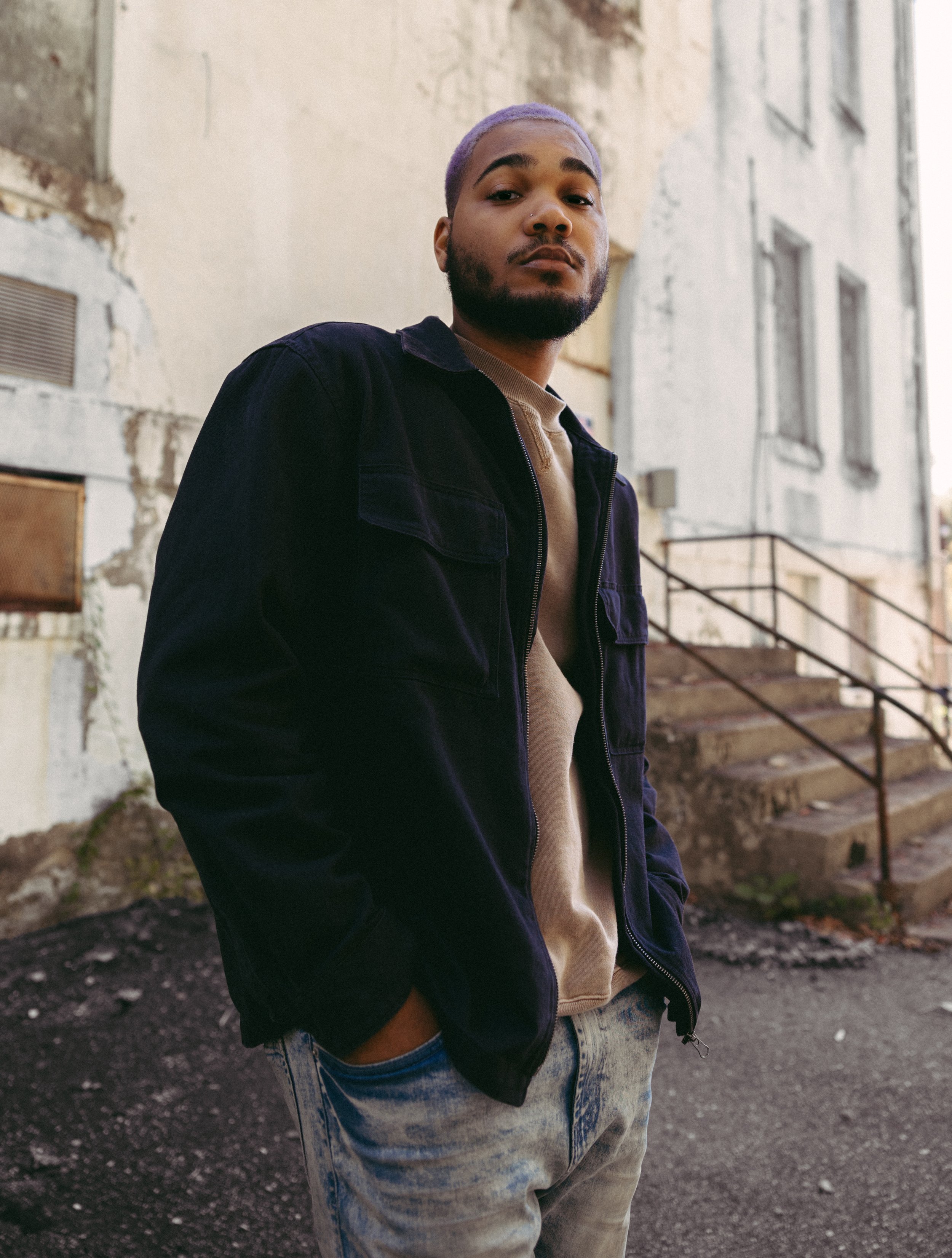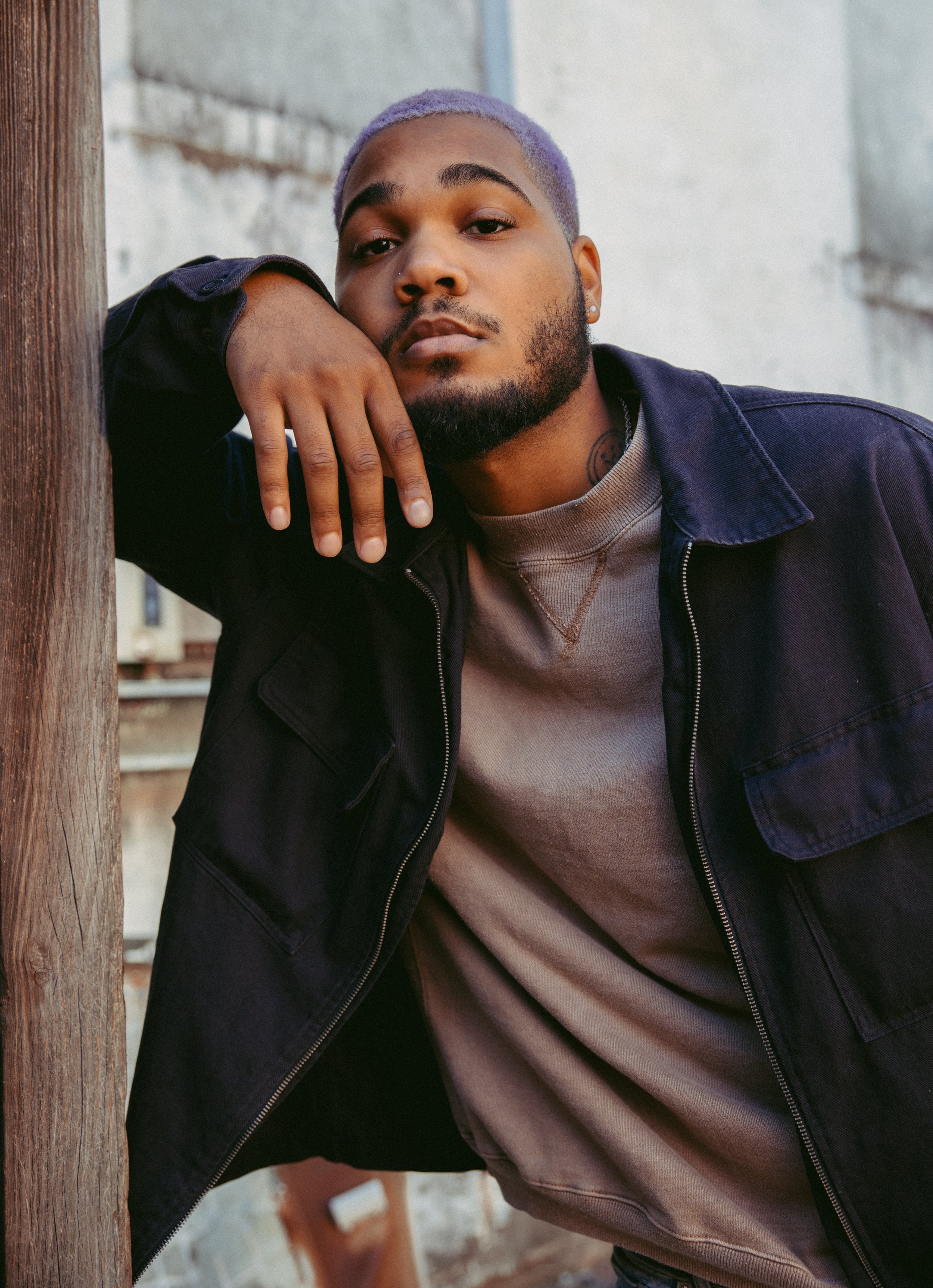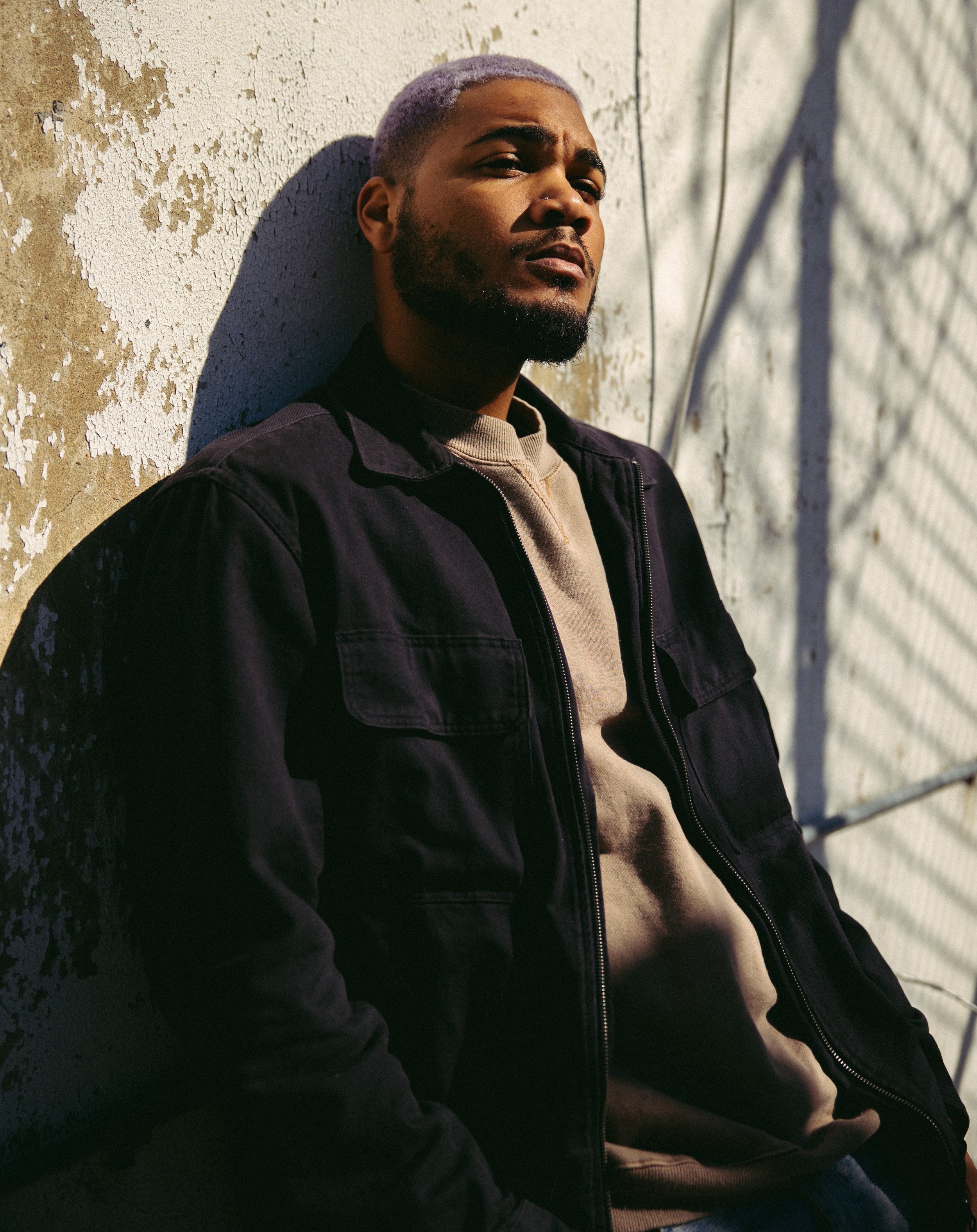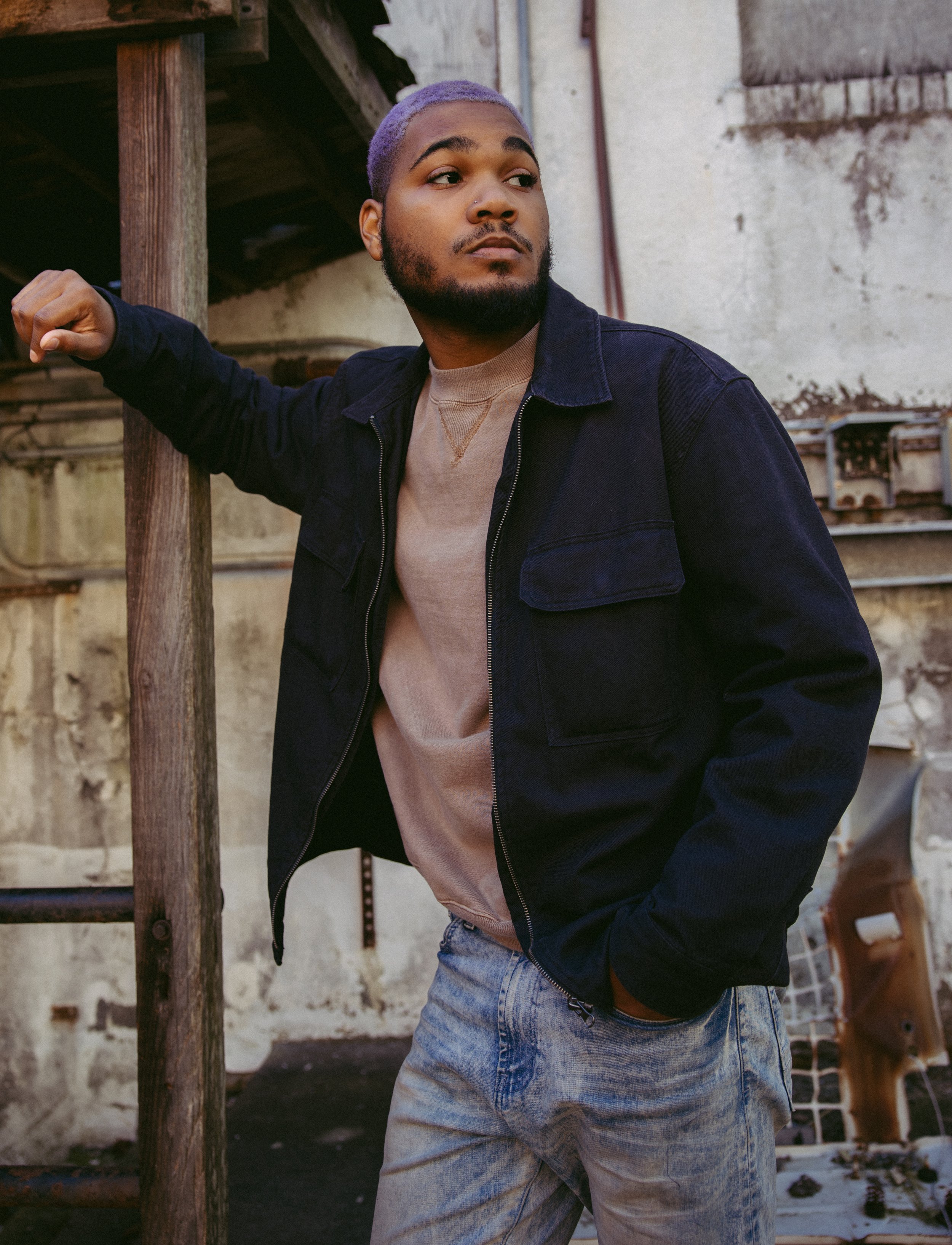MuhTeYoh Talks About Being Homeschooled and Balancing Dreams With Life's Reality
Photography by Larry Lewis.
In a candid and introspective interview with Muhteyoh, the rising music artist opens up about his upbringing, his then-upcoming album ‘LAVNDR.’, and potentially stepping away from music. At the time of this interview in November 2022, me and Muhteyoh reflected on the past year. Muhteyoh shares, "A lot of things happened. I think since about 2016 or 2015 is when I was doing music seriously. And for like 2017 until about 2019, I was just going hard, doing everything that I felt like I needed to do." However, life took unexpected turns with family responsibilities and personal doubts, leading him to question his path. Muhteyoh's story is one of self-discovery and finding the balance between pursuing dreams and embracing life's realities.
Muhteyoh’s highly-anticipated 11-track album Lavendr. dropped on February 16 of this year, racking over 5,000 streams in just one week. With a studded lineup of credits including artists like Foggieraw, Kcasso, Niya Imani, and Lil Røcket, and producer Dave James as well as a cameo from Little Bacon Bear, the project was undoubtedly a cultural event for the region. In a literal sense, his latest headlining musical appearance for the ‘Goodbye Summer Love’ show at The Village DC sold out, gathering around 150 supporters, listeners, and fellow artists. It was co-organized by the entertainment collective he helped found, L.A.I.D. Gang.
As the co-founder of L.A.I.D. Gang, Muhteyoh pours his time not only into his own craft but in support of his peers’ craft. The collective specializes in music and visual production, known for its vividly cinematic music videos and short films. They commonly work with other artists in the region on visual collaborations, events, modeling, music, and more. Muhteyoh embraces L.A.I.D. Gang’s potential and openness, saying: “If we really mess with somebody and we need to do something creatively or have their creative direction, we’ll probably [collaborate with them] under that. So really expressing as much as we can without limitations.”
I recently asked Muhteyoh if he’s had the chance to reflect on his current feelings and assess what truly brings him fulfillment and happiness. “What truly brings me happiness and fulfillment is being able to use my gifts and talents to help someone else see their value. If something I have or know can be utilized to share information with someone else, then I feel fulfillment. Sometimes it’s as simple as a conversation, helping people believe it or not brings me happiness.”
Here’s our full conversation.
Damon: Cool. So last year around this time you were like, I'm gonna quit music. What happened?
MuhTeyOh: So, a lot of things happened. I think since about 2015 or 2016 is when I was doing music seriously. And for like 2017 until about 2019, I was just going hard, doing everything that I felt like I needed to do. My friends were just like, "Yo, MuhTeyOh, you're different. You have the look, you can engage with people," this, that, and the third. And I was like, right, cool. And I devoted so much of my twenties to like whatever chasing the dream was. And then life happens, you know, life happens a lot. My family moved to California. My grandma got sick. The pandemic, all these things happened and I found myself being kind of like a caretaker to like my grandma and my uncle.
I didn't really have the mental capacity to, like, chase the dream. Like I was starting to get to that age where it's just like, what am I doing? You know, what is really going on? You kind of wake up one day and you look around and you see all your friend getting married and having children and living their lives. And you're that one friend who's still chasing the dream. And it's cool, but it's not really like feeding you, you know? So it was kind of one of those things where I had to really assess and just kind of like decide: Yeah. I don't know if this is gonna be it for me-type-situation.
D: How old are you?
M: Um, I'm 20-something [laughs]. It's cool, I'm [redacted]. Most people don't know that. Most people look at me and it's like, what?
D: Yeah. No, I would've never guessed! I wanted to go a bit backward now and into your childhood. Didn’t you start playing the drums at seven years old?
M: I think it was like seven.
D: And then what happened next?
M: Well music was actually a really big part of my family. Not even just like recording, but just like music in general. I remember, um, I started playing at least seven. I came up in a church. In all of my life, cousins, uncles, and aunties–they kind of ran the worship team. So my older cousin, he played drums and that's how I got into the drums. It was him and my other cousin. They were like into Gogo and stuff like that. I remember one time I started playing the drums and my cousin Esther was just like, you need to learn how to do the bounce beat. Because I would do it, but I would do it the wrong way.
And so I would just be in my house practicing that all the time. And my father, who played the guitar, and I would write songs in our basement. From there it just kind of just kept growing. My family had a band. It was called the Mustangz. And we played a couple shows and stuff. From then on, I just kind of like stuck with music. I started playing the piano more because I used to play as a kid. Then somewhere along the lines I fell into rapping and stuff like that. So it just kind of stuck.
D: Never thought about like, singing or anything like that?
M: I tried, but someone close to me was just like: you shouldn't sing. So that really kind of hurt my feelings cuz they were important to me. So it was just like, okay… but I kept going. Like, I'm not a person that holds grudges but I just use it as fuel. So, you know, not to jump ahead, but the new project has a lot of singing on it. I'm not saying it's the greatest singing in the world. But you know, it's there. There's certain things you can't rap, you gotta sing it.
D: I feel like that's something that fits you, you know? I also learned that you were homeschooled so I was really interested cause I don't meet a lot of people who were homeschooled. How do you think that shaped you as a person and maybe an artist?
M: I think gave me my individuality. The closest I had to having a school experience was a childhood friend of mine who invited me to the his school for dances and pep rallies. And he was in the marching band. And when I was like 12, I went to Australia for this thing called People to People Student Ambassadors. And I was there with all these kids that went to public school and I was the only kid who was home schooled. So it was a culture shock. It was a shock then, and also when I attended PGCC, and it was a culture shock there too. I think it made me close with my family–like very close with my mother who taught me. It gave me a sense of independence. Like, I can do this. I can teach myself, you know, not that hard. So I think it kind of gave you that drive to like figure things out. Cuz I'm like a problem solver. Not in an annoying way, but I like to figure things out. I like to know how certain things work.
D: Did you learn with other kids, other siblings?
M: Um, yeah. It's such a long time ago. We'd go to a church or someone's home and we'd have curriculums. There would be curriculums that you could buy online. And my mom was a retired teacher. So it's not like she was just any random person off the streets. She was actually a teacher, so, she already had the know-how. So yeah, when I got into high school, I actually went to high school, and like, I'm gonna get slack for this, but I went to school in Waldorf at this church in La Plata. I was in a really big church and there were different classrooms and they would allow us to come there and have a lot of options.
D: That's really interesting. I mean that sounds like a very unique upbringing for sure. Regarding your development as an artist, I was wondering who influenced you over the years? Who are the artists that have influenced you over the years?
M: Um, so like I said, I grew up in a church, so like, I wasn't exposed to secular music until I was a sophomore in high school. So one of the first things I was influenced by was 8 Mile. And Eminem is actually my mom's favorite rapper for whatever reason. So early on it was like Eminem, Jay-Z, Childish Gambino, Mac Miller, Lupe and Kanye. So those were what I was exposed to, but what influenced me most was probably like--I think Drake influenced my vulnerability. But what really held me over was Childish Gambino because I think I just related to him a lot. Being a black kid whose like--I'm not dark-skinned but I'm not light-light-skinned. I'm kind of in-between. I used to longboard and rollerskate, and I was homeschooled, so I'm like very outsider vibes, you know? Plus I wasn't disciplined a lot. So I think that was someone that I gravitated to the most– and Odd Future.
D: No, yeah. That makes a lot of sense. A little more along those lines–is there anyone in your life who helped you get to where you are now? Like who you would credit with maybe helping you the most along your journey?
M: Um, I mean, to quote, you know, the great Snoop, Issa Rae: me. [Laugh] I would say the person, the closest is my business partner Ryan, colloquially known as Lil Røcket. He and I have been shooting videos since like 2011, shooting shorts and stuff. And he's always telling me, "I really like shooting your videos because it pushes us to create things." He's stuck with me since he was actually one of the first people that told me I should do a mixtape. So he's been my biggest supporter just moving through the wire together.
D: Yeah, I was interested in you guys’ connection because it seems like you collaborate a lot and it looks like you have a really solid partnership and mutual relationship.
M: We went to together school, he was home-schooled too. So we met in high school and like, we weren't really friends, we became friends over the summer, like by accident. It's a weird story. I will tell it. [laughs] But it was, it was interesting. Basically, me and someone else weren't cool anymore. He tried to help us get back friends and then by default he and I became friends. And we just had a lot of interest. Like, I used to dance a lot back in the day and he would dance too. So like, we would try to run off each other. Like, I would drop a YouTube video, he'd drop a Youtube video. I'd do a dance video, he would do a dance video.
D: Awesome. Looks like it was meant to happen. We love a good connection. Switching to the music, what should the people expect with ‘LAVNDR.’?
M: A lot of vulnerability and raw emotion. Anyone who knows me, who's ever followed my music knows that I'm like very raw, sometimes too raw. I think whatever questions people have, I don't know if I answer them, but I definitely at least try to let you hear what all is going on because it's all past tense now. But, uh, they can expect vibes. I think there’s something on it for everybody. Storytelling. Some guest appearances, some DMV heavy hitters. Yeah. And, you know, just me. I think it will be relatable for people who have had relationships.
D: Could you tease how many songs are on an album?
M: Yeah. It's 11.
D: Okay. So let's say you release the album, and it goes insanely well. Do you return to music? Do you keep it coming?
M: Um, I don't know. It would have to make sense. Um, I'm at a point in my life where I don't want to sacrifice my morals to be somebody, you know. So I feel like it's gonna have to make sense. I definitely want to see my people, like L.A.I.D. Gang, the people I work with, grow. And I feel like I can help them in that facet. I'm open to it, you know, anything's possible. My plan is to drop the project and go to Africa, take some pictures, travel, and we'll see where life takes me. But I want to enjoy life. I don't feel I've ever been able to. But I mean, hey, anything is possible.
D: For sure. I think that's very valid. Very real. It sounds like you're entering another chapter in your life. And so these decisions are gonna come with more factors. I know you have the collective L.A.I.D. Gang, but I wanted to learn a bit more about it. Like who's in it and what are you guys trying to do?
M: Um, we kind of use L.A.I.D. Gang like Kanye used G.O.O.D Music. You know, it's kind of like [a hub] for creativity and collaborations. Right now it's me, it's Røc, and Kcasso. And then we have like L.A.I.D. Gang & Friends where we have, our friend Danni, she's a model; ShotbyKel; and the guy who created it, Tim. It's really just a hub of creativity in general. We're just pushing a lot of visuals, working with a lot of artists in the area, um, Hasani, Dave James, and Foggieraw. I wouldn't say it's like a label or anything, but it's really just kind of just another name. Cause what Røcket and I do business-wise, True Noir Pictures, but like, that's completely separate from everything else. This is just like, if we really mess with somebody and we need to do something creatively or have their creative direction, we’ll probably [collaborate with them] under that. So really expressing as much as we can without limitations.
D: That sounds really dope. Sort of connected to it, what do you make of the DMV art scene now and how L.A.I.D. Gang interacts with it and everything?
M: I'm proud the creativity that I'm seeing. I am eager to see it grow more organically. There's a lot of talented individuals. I hate the narrative that the DMV doesn't support. I'm excited because I feel like I personally want to see the DMV scene have better visuals. That's what I strive for. That's what L.A.I.D., Røcket, and I strive for. I feel like that's been something cool. We did a short film and then other people wanted us to shoot their short films and I feel like there's more texture. I see a lot of like cool visuals from select people and I'm excited for people to organically, collaborate because they mess with our work not because you have a hundred thousand followers and I have a couple thousand people you feel me. So yeah, I'm excited. I feel like we're on the cusp of something, you know? I think it's just, you know, in it's beginning stages.
D: For sure. I'll just end with our last question. You sort of touched on it, what's next for you? Um, you said you're gonna go to Africa?
M: Um, well what's next is I got cast in this mini-short. Very talented young woman, Jeremie. She is developing a production called RSVP, about the DC brunch scene and how, uh, very serious that is [laugh]. But I'll be acting in that. And for me, honestly, I would love to just collaborate with more people. I have some overdue collaborations that I have to do both musically and visually, so, you know, I'll still be around. But yeah, I mean, everything's next. I want to do as much as I can and even if it's not music, I'm always gonna be creating things. So I'd love to just work with people and help if I can.





